Tayla’s Case Study
VerifiedAdded on 2023/03/20
|9
|2554
|80
AI Summary
This case study discusses the ethical and legal issues surrounding a fourteen-year-old patient named Tayla. It explores topics such as guardianship, consent, confidentiality, and ethical principles in nursing.
Contribute Materials
Your contribution can guide someone’s learning journey. Share your
documents today.
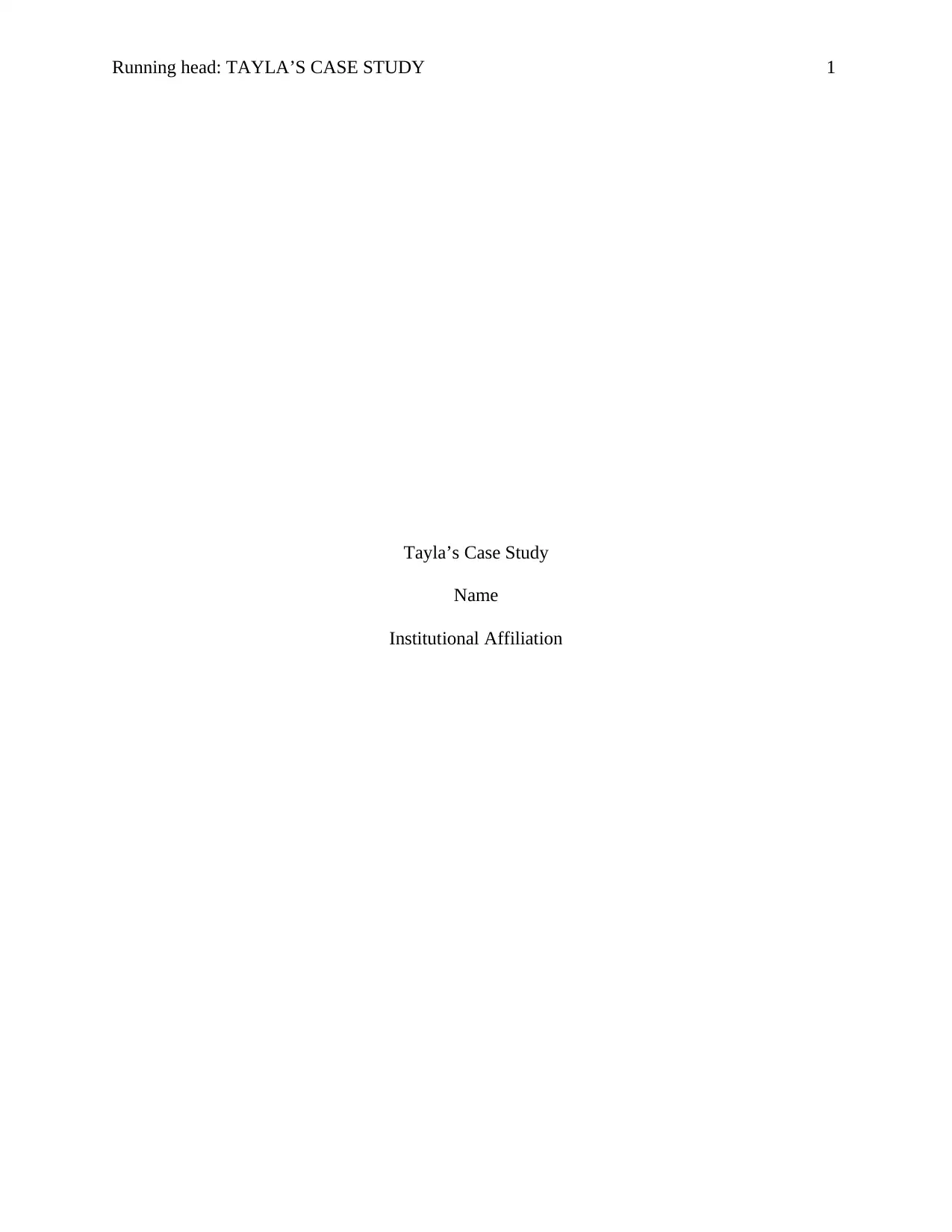
Running head: TAYLA’S CASE STUDY 1
Tayla’s Case Study
Name
Institutional Affiliation
Tayla’s Case Study
Name
Institutional Affiliation
Secure Best Marks with AI Grader
Need help grading? Try our AI Grader for instant feedback on your assignments.
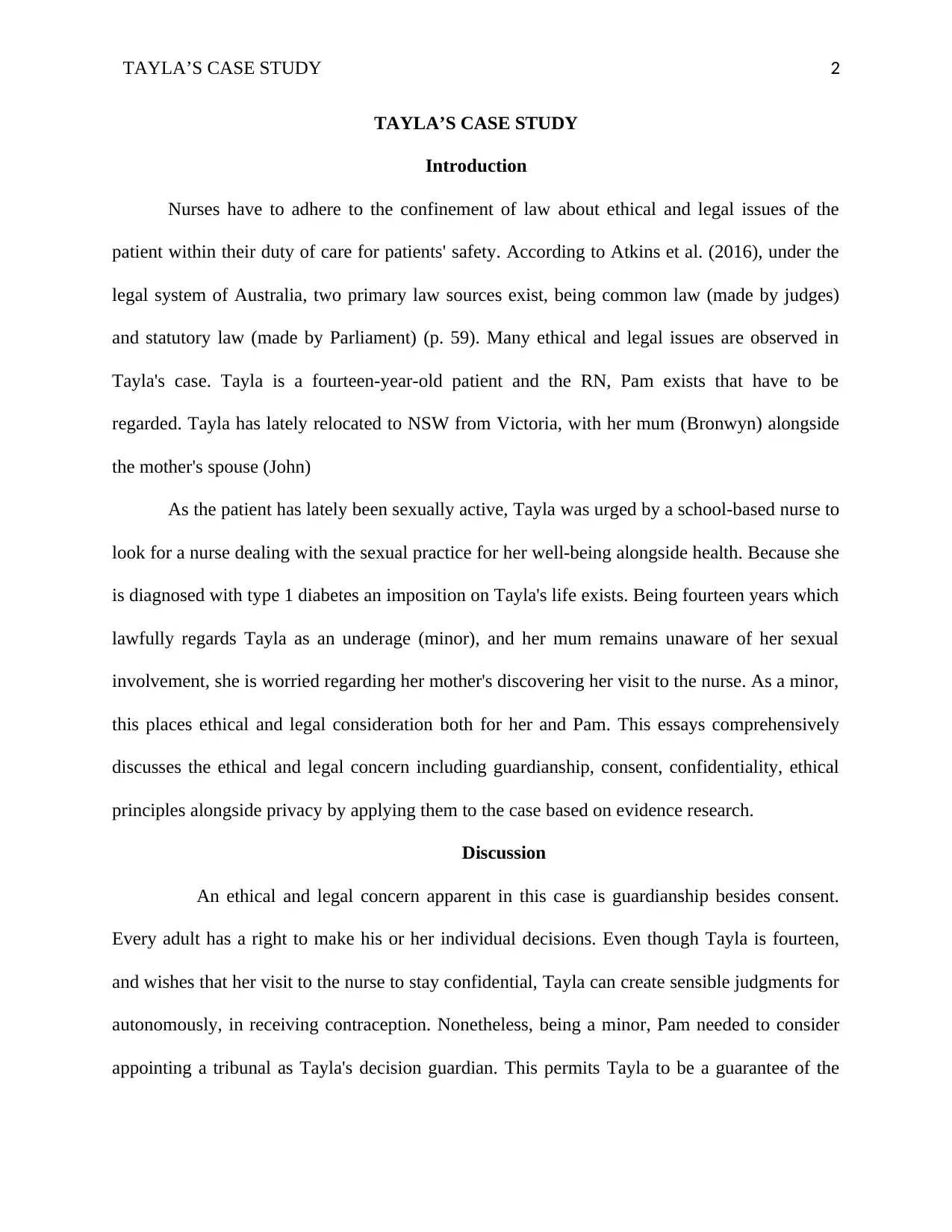
TAYLA’S CASE STUDY 2
TAYLA’S CASE STUDY
Introduction
Nurses have to adhere to the confinement of law about ethical and legal issues of the
patient within their duty of care for patients' safety. According to Atkins et al. (2016), under the
legal system of Australia, two primary law sources exist, being common law (made by judges)
and statutory law (made by Parliament) (p. 59). Many ethical and legal issues are observed in
Tayla's case. Tayla is a fourteen-year-old patient and the RN, Pam exists that have to be
regarded. Tayla has lately relocated to NSW from Victoria, with her mum (Bronwyn) alongside
the mother's spouse (John)
As the patient has lately been sexually active, Tayla was urged by a school-based nurse to
look for a nurse dealing with the sexual practice for her well-being alongside health. Because she
is diagnosed with type 1 diabetes an imposition on Tayla's life exists. Being fourteen years which
lawfully regards Tayla as an underage (minor), and her mum remains unaware of her sexual
involvement, she is worried regarding her mother's discovering her visit to the nurse. As a minor,
this places ethical and legal consideration both for her and Pam. This essays comprehensively
discusses the ethical and legal concern including guardianship, consent, confidentiality, ethical
principles alongside privacy by applying them to the case based on evidence research.
Discussion
An ethical and legal concern apparent in this case is guardianship besides consent.
Every adult has a right to make his or her individual decisions. Even though Tayla is fourteen,
and wishes that her visit to the nurse to stay confidential, Tayla can create sensible judgments for
autonomously, in receiving contraception. Nonetheless, being a minor, Pam needed to consider
appointing a tribunal as Tayla's decision guardian. This permits Tayla to be a guarantee of the
TAYLA’S CASE STUDY
Introduction
Nurses have to adhere to the confinement of law about ethical and legal issues of the
patient within their duty of care for patients' safety. According to Atkins et al. (2016), under the
legal system of Australia, two primary law sources exist, being common law (made by judges)
and statutory law (made by Parliament) (p. 59). Many ethical and legal issues are observed in
Tayla's case. Tayla is a fourteen-year-old patient and the RN, Pam exists that have to be
regarded. Tayla has lately relocated to NSW from Victoria, with her mum (Bronwyn) alongside
the mother's spouse (John)
As the patient has lately been sexually active, Tayla was urged by a school-based nurse to
look for a nurse dealing with the sexual practice for her well-being alongside health. Because she
is diagnosed with type 1 diabetes an imposition on Tayla's life exists. Being fourteen years which
lawfully regards Tayla as an underage (minor), and her mum remains unaware of her sexual
involvement, she is worried regarding her mother's discovering her visit to the nurse. As a minor,
this places ethical and legal consideration both for her and Pam. This essays comprehensively
discusses the ethical and legal concern including guardianship, consent, confidentiality, ethical
principles alongside privacy by applying them to the case based on evidence research.
Discussion
An ethical and legal concern apparent in this case is guardianship besides consent.
Every adult has a right to make his or her individual decisions. Even though Tayla is fourteen,
and wishes that her visit to the nurse to stay confidential, Tayla can create sensible judgments for
autonomously, in receiving contraception. Nonetheless, being a minor, Pam needed to consider
appointing a tribunal as Tayla's decision guardian. This permits Tayla to be a guarantee of the
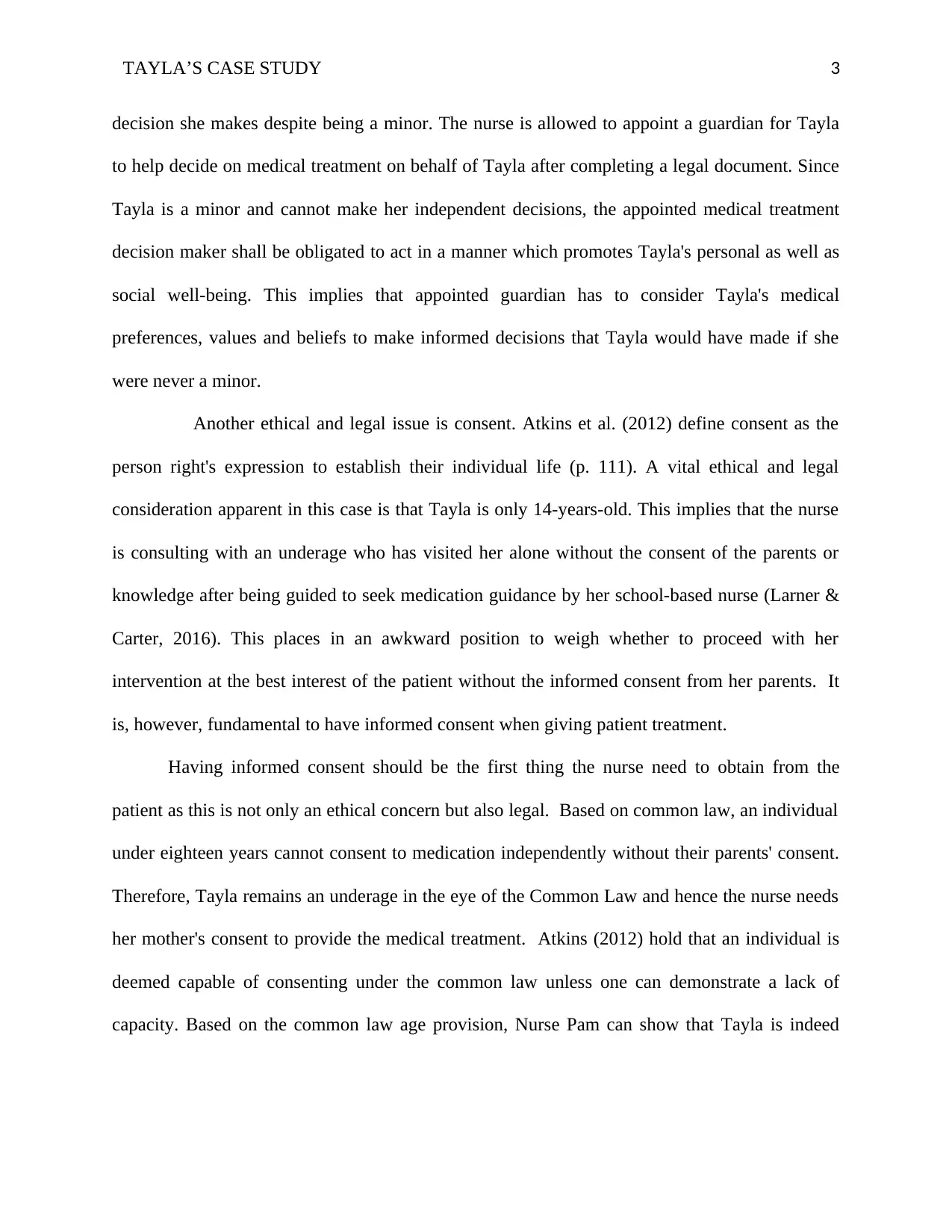
TAYLA’S CASE STUDY 3
decision she makes despite being a minor. The nurse is allowed to appoint a guardian for Tayla
to help decide on medical treatment on behalf of Tayla after completing a legal document. Since
Tayla is a minor and cannot make her independent decisions, the appointed medical treatment
decision maker shall be obligated to act in a manner which promotes Tayla's personal as well as
social well-being. This implies that appointed guardian has to consider Tayla's medical
preferences, values and beliefs to make informed decisions that Tayla would have made if she
were never a minor.
Another ethical and legal issue is consent. Atkins et al. (2012) define consent as the
person right's expression to establish their individual life (p. 111). A vital ethical and legal
consideration apparent in this case is that Tayla is only 14-years-old. This implies that the nurse
is consulting with an underage who has visited her alone without the consent of the parents or
knowledge after being guided to seek medication guidance by her school-based nurse (Larner &
Carter, 2016). This places in an awkward position to weigh whether to proceed with her
intervention at the best interest of the patient without the informed consent from her parents. It
is, however, fundamental to have informed consent when giving patient treatment.
Having informed consent should be the first thing the nurse need to obtain from the
patient as this is not only an ethical concern but also legal. Based on common law, an individual
under eighteen years cannot consent to medication independently without their parents' consent.
Therefore, Tayla remains an underage in the eye of the Common Law and hence the nurse needs
her mother's consent to provide the medical treatment. Atkins (2012) hold that an individual is
deemed capable of consenting under the common law unless one can demonstrate a lack of
capacity. Based on the common law age provision, Nurse Pam can show that Tayla is indeed
decision she makes despite being a minor. The nurse is allowed to appoint a guardian for Tayla
to help decide on medical treatment on behalf of Tayla after completing a legal document. Since
Tayla is a minor and cannot make her independent decisions, the appointed medical treatment
decision maker shall be obligated to act in a manner which promotes Tayla's personal as well as
social well-being. This implies that appointed guardian has to consider Tayla's medical
preferences, values and beliefs to make informed decisions that Tayla would have made if she
were never a minor.
Another ethical and legal issue is consent. Atkins et al. (2012) define consent as the
person right's expression to establish their individual life (p. 111). A vital ethical and legal
consideration apparent in this case is that Tayla is only 14-years-old. This implies that the nurse
is consulting with an underage who has visited her alone without the consent of the parents or
knowledge after being guided to seek medication guidance by her school-based nurse (Larner &
Carter, 2016). This places in an awkward position to weigh whether to proceed with her
intervention at the best interest of the patient without the informed consent from her parents. It
is, however, fundamental to have informed consent when giving patient treatment.
Having informed consent should be the first thing the nurse need to obtain from the
patient as this is not only an ethical concern but also legal. Based on common law, an individual
under eighteen years cannot consent to medication independently without their parents' consent.
Therefore, Tayla remains an underage in the eye of the Common Law and hence the nurse needs
her mother's consent to provide the medical treatment. Atkins (2012) hold that an individual is
deemed capable of consenting under the common law unless one can demonstrate a lack of
capacity. Based on the common law age provision, Nurse Pam can show that Tayla is indeed
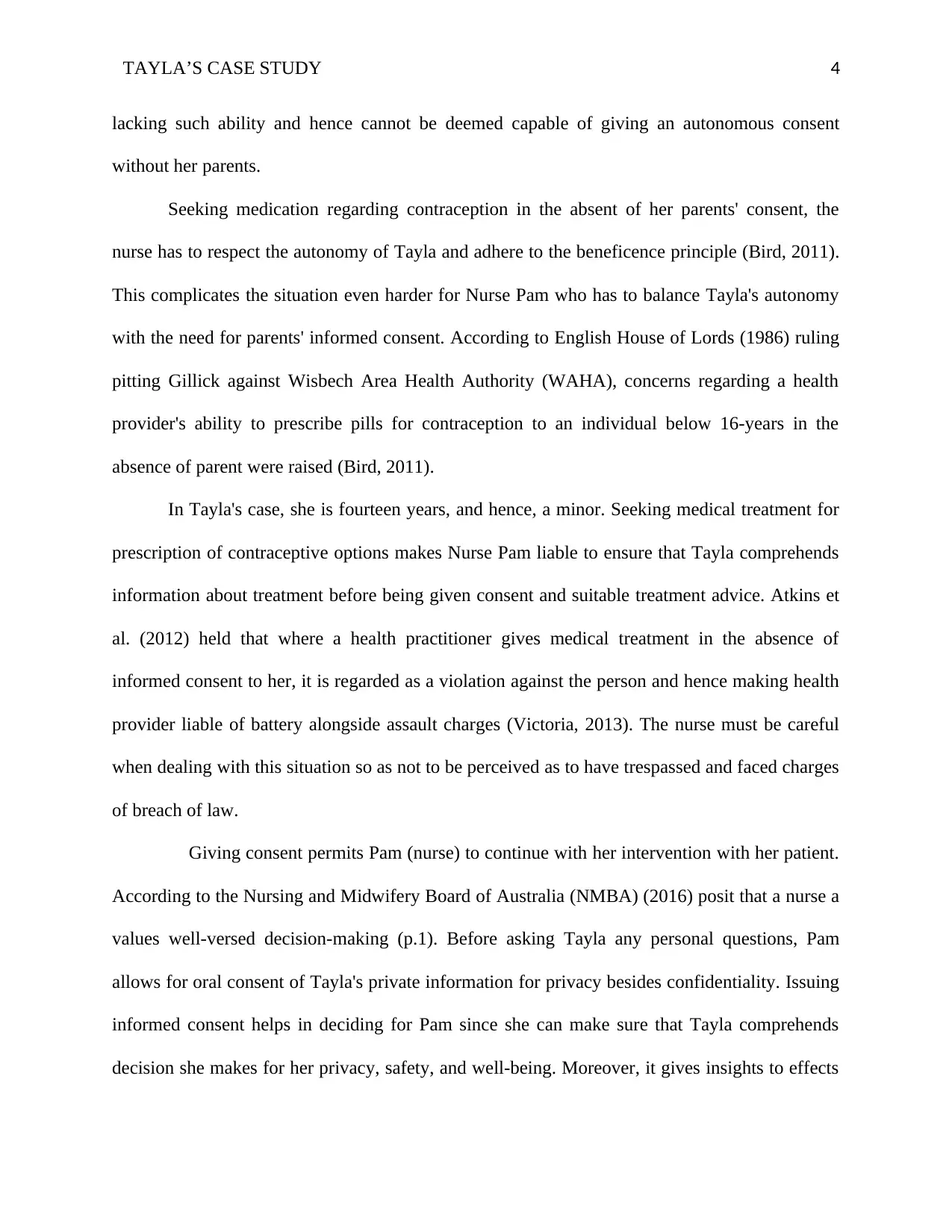
TAYLA’S CASE STUDY 4
lacking such ability and hence cannot be deemed capable of giving an autonomous consent
without her parents.
Seeking medication regarding contraception in the absent of her parents' consent, the
nurse has to respect the autonomy of Tayla and adhere to the beneficence principle (Bird, 2011).
This complicates the situation even harder for Nurse Pam who has to balance Tayla's autonomy
with the need for parents' informed consent. According to English House of Lords (1986) ruling
pitting Gillick against Wisbech Area Health Authority (WAHA), concerns regarding a health
provider's ability to prescribe pills for contraception to an individual below 16-years in the
absence of parent were raised (Bird, 2011).
In Tayla's case, she is fourteen years, and hence, a minor. Seeking medical treatment for
prescription of contraceptive options makes Nurse Pam liable to ensure that Tayla comprehends
information about treatment before being given consent and suitable treatment advice. Atkins et
al. (2012) held that where a health practitioner gives medical treatment in the absence of
informed consent to her, it is regarded as a violation against the person and hence making health
provider liable of battery alongside assault charges (Victoria, 2013). The nurse must be careful
when dealing with this situation so as not to be perceived as to have trespassed and faced charges
of breach of law.
Giving consent permits Pam (nurse) to continue with her intervention with her patient.
According to the Nursing and Midwifery Board of Australia (NMBA) (2016) posit that a nurse a
values well-versed decision-making (p.1). Before asking Tayla any personal questions, Pam
allows for oral consent of Tayla's private information for privacy besides confidentiality. Issuing
informed consent helps in deciding for Pam since she can make sure that Tayla comprehends
decision she makes for her privacy, safety, and well-being. Moreover, it gives insights to effects
lacking such ability and hence cannot be deemed capable of giving an autonomous consent
without her parents.
Seeking medication regarding contraception in the absent of her parents' consent, the
nurse has to respect the autonomy of Tayla and adhere to the beneficence principle (Bird, 2011).
This complicates the situation even harder for Nurse Pam who has to balance Tayla's autonomy
with the need for parents' informed consent. According to English House of Lords (1986) ruling
pitting Gillick against Wisbech Area Health Authority (WAHA), concerns regarding a health
provider's ability to prescribe pills for contraception to an individual below 16-years in the
absence of parent were raised (Bird, 2011).
In Tayla's case, she is fourteen years, and hence, a minor. Seeking medical treatment for
prescription of contraceptive options makes Nurse Pam liable to ensure that Tayla comprehends
information about treatment before being given consent and suitable treatment advice. Atkins et
al. (2012) held that where a health practitioner gives medical treatment in the absence of
informed consent to her, it is regarded as a violation against the person and hence making health
provider liable of battery alongside assault charges (Victoria, 2013). The nurse must be careful
when dealing with this situation so as not to be perceived as to have trespassed and faced charges
of breach of law.
Giving consent permits Pam (nurse) to continue with her intervention with her patient.
According to the Nursing and Midwifery Board of Australia (NMBA) (2016) posit that a nurse a
values well-versed decision-making (p.1). Before asking Tayla any personal questions, Pam
allows for oral consent of Tayla's private information for privacy besides confidentiality. Issuing
informed consent helps in deciding for Pam since she can make sure that Tayla comprehends
decision she makes for her privacy, safety, and well-being. Moreover, it gives insights to effects
Secure Best Marks with AI Grader
Need help grading? Try our AI Grader for instant feedback on your assignments.
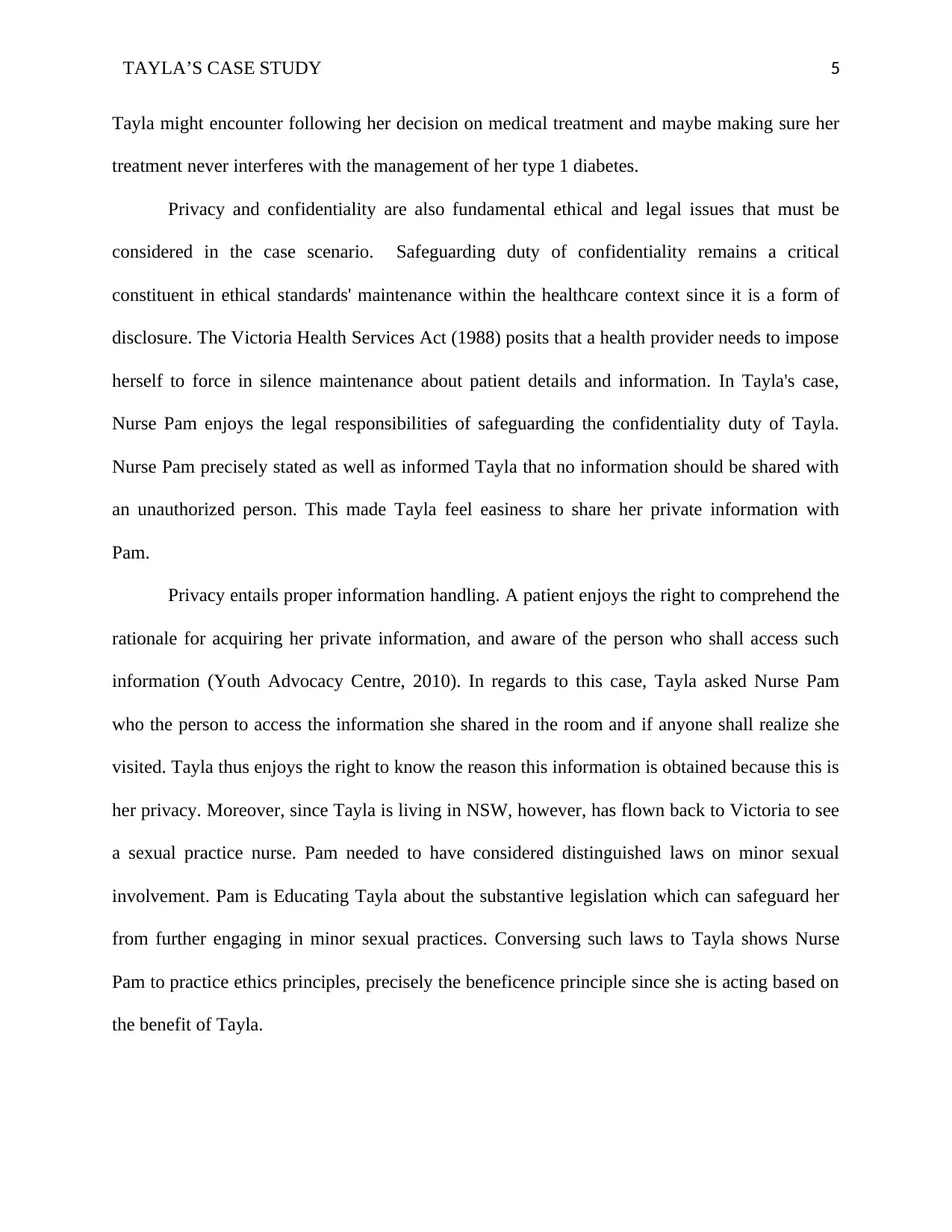
TAYLA’S CASE STUDY 5
Tayla might encounter following her decision on medical treatment and maybe making sure her
treatment never interferes with the management of her type 1 diabetes.
Privacy and confidentiality are also fundamental ethical and legal issues that must be
considered in the case scenario. Safeguarding duty of confidentiality remains a critical
constituent in ethical standards' maintenance within the healthcare context since it is a form of
disclosure. The Victoria Health Services Act (1988) posits that a health provider needs to impose
herself to force in silence maintenance about patient details and information. In Tayla's case,
Nurse Pam enjoys the legal responsibilities of safeguarding the confidentiality duty of Tayla.
Nurse Pam precisely stated as well as informed Tayla that no information should be shared with
an unauthorized person. This made Tayla feel easiness to share her private information with
Pam.
Privacy entails proper information handling. A patient enjoys the right to comprehend the
rationale for acquiring her private information, and aware of the person who shall access such
information (Youth Advocacy Centre, 2010). In regards to this case, Tayla asked Nurse Pam
who the person to access the information she shared in the room and if anyone shall realize she
visited. Tayla thus enjoys the right to know the reason this information is obtained because this is
her privacy. Moreover, since Tayla is living in NSW, however, has flown back to Victoria to see
a sexual practice nurse. Pam needed to have considered distinguished laws on minor sexual
involvement. Pam is Educating Tayla about the substantive legislation which can safeguard her
from further engaging in minor sexual practices. Conversing such laws to Tayla shows Nurse
Pam to practice ethics principles, precisely the beneficence principle since she is acting based on
the benefit of Tayla.
Tayla might encounter following her decision on medical treatment and maybe making sure her
treatment never interferes with the management of her type 1 diabetes.
Privacy and confidentiality are also fundamental ethical and legal issues that must be
considered in the case scenario. Safeguarding duty of confidentiality remains a critical
constituent in ethical standards' maintenance within the healthcare context since it is a form of
disclosure. The Victoria Health Services Act (1988) posits that a health provider needs to impose
herself to force in silence maintenance about patient details and information. In Tayla's case,
Nurse Pam enjoys the legal responsibilities of safeguarding the confidentiality duty of Tayla.
Nurse Pam precisely stated as well as informed Tayla that no information should be shared with
an unauthorized person. This made Tayla feel easiness to share her private information with
Pam.
Privacy entails proper information handling. A patient enjoys the right to comprehend the
rationale for acquiring her private information, and aware of the person who shall access such
information (Youth Advocacy Centre, 2010). In regards to this case, Tayla asked Nurse Pam
who the person to access the information she shared in the room and if anyone shall realize she
visited. Tayla thus enjoys the right to know the reason this information is obtained because this is
her privacy. Moreover, since Tayla is living in NSW, however, has flown back to Victoria to see
a sexual practice nurse. Pam needed to have considered distinguished laws on minor sexual
involvement. Pam is Educating Tayla about the substantive legislation which can safeguard her
from further engaging in minor sexual practices. Conversing such laws to Tayla shows Nurse
Pam to practice ethics principles, precisely the beneficence principle since she is acting based on
the benefit of Tayla.
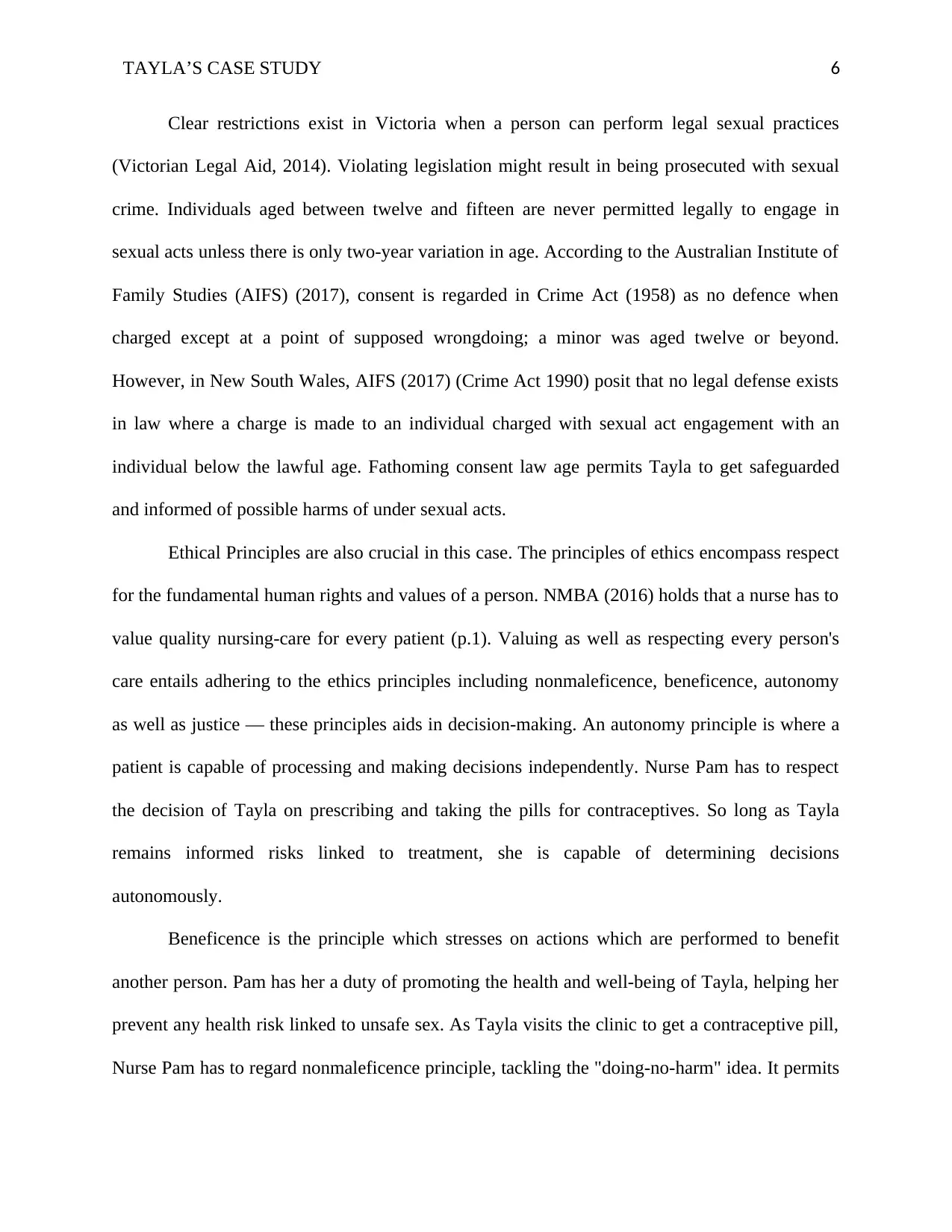
TAYLA’S CASE STUDY 6
Clear restrictions exist in Victoria when a person can perform legal sexual practices
(Victorian Legal Aid, 2014). Violating legislation might result in being prosecuted with sexual
crime. Individuals aged between twelve and fifteen are never permitted legally to engage in
sexual acts unless there is only two-year variation in age. According to the Australian Institute of
Family Studies (AIFS) (2017), consent is regarded in Crime Act (1958) as no defence when
charged except at a point of supposed wrongdoing; a minor was aged twelve or beyond.
However, in New South Wales, AIFS (2017) (Crime Act 1990) posit that no legal defense exists
in law where a charge is made to an individual charged with sexual act engagement with an
individual below the lawful age. Fathoming consent law age permits Tayla to get safeguarded
and informed of possible harms of under sexual acts.
Ethical Principles are also crucial in this case. The principles of ethics encompass respect
for the fundamental human rights and values of a person. NMBA (2016) holds that a nurse has to
value quality nursing-care for every patient (p.1). Valuing as well as respecting every person's
care entails adhering to the ethics principles including nonmaleficence, beneficence, autonomy
as well as justice — these principles aids in decision-making. An autonomy principle is where a
patient is capable of processing and making decisions independently. Nurse Pam has to respect
the decision of Tayla on prescribing and taking the pills for contraceptives. So long as Tayla
remains informed risks linked to treatment, she is capable of determining decisions
autonomously.
Beneficence is the principle which stresses on actions which are performed to benefit
another person. Pam has her a duty of promoting the health and well-being of Tayla, helping her
prevent any health risk linked to unsafe sex. As Tayla visits the clinic to get a contraceptive pill,
Nurse Pam has to regard nonmaleficence principle, tackling the "doing-no-harm" idea. It permits
Clear restrictions exist in Victoria when a person can perform legal sexual practices
(Victorian Legal Aid, 2014). Violating legislation might result in being prosecuted with sexual
crime. Individuals aged between twelve and fifteen are never permitted legally to engage in
sexual acts unless there is only two-year variation in age. According to the Australian Institute of
Family Studies (AIFS) (2017), consent is regarded in Crime Act (1958) as no defence when
charged except at a point of supposed wrongdoing; a minor was aged twelve or beyond.
However, in New South Wales, AIFS (2017) (Crime Act 1990) posit that no legal defense exists
in law where a charge is made to an individual charged with sexual act engagement with an
individual below the lawful age. Fathoming consent law age permits Tayla to get safeguarded
and informed of possible harms of under sexual acts.
Ethical Principles are also crucial in this case. The principles of ethics encompass respect
for the fundamental human rights and values of a person. NMBA (2016) holds that a nurse has to
value quality nursing-care for every patient (p.1). Valuing as well as respecting every person's
care entails adhering to the ethics principles including nonmaleficence, beneficence, autonomy
as well as justice — these principles aids in decision-making. An autonomy principle is where a
patient is capable of processing and making decisions independently. Nurse Pam has to respect
the decision of Tayla on prescribing and taking the pills for contraceptives. So long as Tayla
remains informed risks linked to treatment, she is capable of determining decisions
autonomously.
Beneficence is the principle which stresses on actions which are performed to benefit
another person. Pam has her a duty of promoting the health and well-being of Tayla, helping her
prevent any health risk linked to unsafe sex. As Tayla visits the clinic to get a contraceptive pill,
Nurse Pam has to regard nonmaleficence principle, tackling the "doing-no-harm" idea. It permits
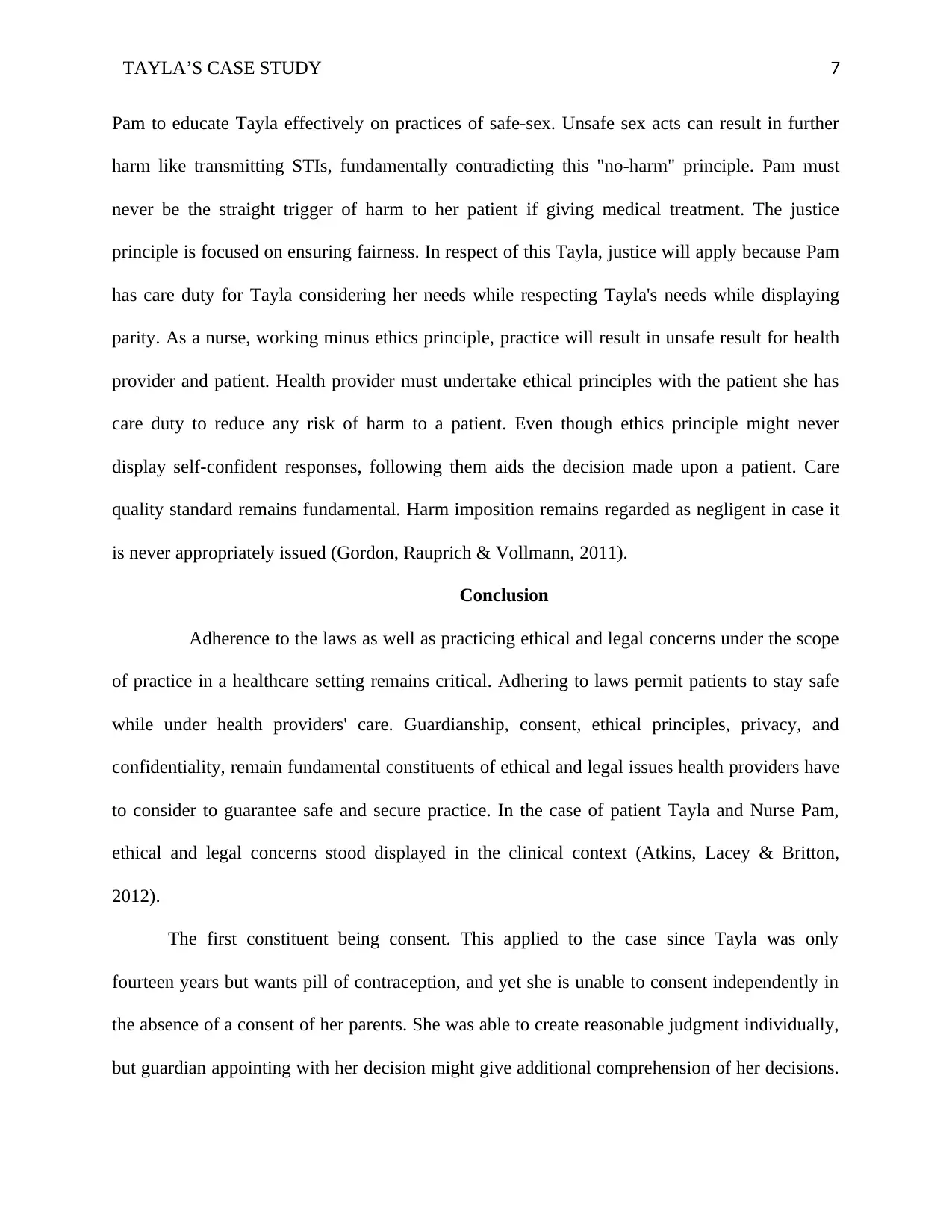
TAYLA’S CASE STUDY 7
Pam to educate Tayla effectively on practices of safe-sex. Unsafe sex acts can result in further
harm like transmitting STIs, fundamentally contradicting this "no-harm" principle. Pam must
never be the straight trigger of harm to her patient if giving medical treatment. The justice
principle is focused on ensuring fairness. In respect of this Tayla, justice will apply because Pam
has care duty for Tayla considering her needs while respecting Tayla's needs while displaying
parity. As a nurse, working minus ethics principle, practice will result in unsafe result for health
provider and patient. Health provider must undertake ethical principles with the patient she has
care duty to reduce any risk of harm to a patient. Even though ethics principle might never
display self-confident responses, following them aids the decision made upon a patient. Care
quality standard remains fundamental. Harm imposition remains regarded as negligent in case it
is never appropriately issued (Gordon, Rauprich & Vollmann, 2011).
Conclusion
Adherence to the laws as well as practicing ethical and legal concerns under the scope
of practice in a healthcare setting remains critical. Adhering to laws permit patients to stay safe
while under health providers' care. Guardianship, consent, ethical principles, privacy, and
confidentiality, remain fundamental constituents of ethical and legal issues health providers have
to consider to guarantee safe and secure practice. In the case of patient Tayla and Nurse Pam,
ethical and legal concerns stood displayed in the clinical context (Atkins, Lacey & Britton,
2012).
The first constituent being consent. This applied to the case since Tayla was only
fourteen years but wants pill of contraception, and yet she is unable to consent independently in
the absence of a consent of her parents. She was able to create reasonable judgment individually,
but guardian appointing with her decision might give additional comprehension of her decisions.
Pam to educate Tayla effectively on practices of safe-sex. Unsafe sex acts can result in further
harm like transmitting STIs, fundamentally contradicting this "no-harm" principle. Pam must
never be the straight trigger of harm to her patient if giving medical treatment. The justice
principle is focused on ensuring fairness. In respect of this Tayla, justice will apply because Pam
has care duty for Tayla considering her needs while respecting Tayla's needs while displaying
parity. As a nurse, working minus ethics principle, practice will result in unsafe result for health
provider and patient. Health provider must undertake ethical principles with the patient she has
care duty to reduce any risk of harm to a patient. Even though ethics principle might never
display self-confident responses, following them aids the decision made upon a patient. Care
quality standard remains fundamental. Harm imposition remains regarded as negligent in case it
is never appropriately issued (Gordon, Rauprich & Vollmann, 2011).
Conclusion
Adherence to the laws as well as practicing ethical and legal concerns under the scope
of practice in a healthcare setting remains critical. Adhering to laws permit patients to stay safe
while under health providers' care. Guardianship, consent, ethical principles, privacy, and
confidentiality, remain fundamental constituents of ethical and legal issues health providers have
to consider to guarantee safe and secure practice. In the case of patient Tayla and Nurse Pam,
ethical and legal concerns stood displayed in the clinical context (Atkins, Lacey & Britton,
2012).
The first constituent being consent. This applied to the case since Tayla was only
fourteen years but wants pill of contraception, and yet she is unable to consent independently in
the absence of a consent of her parents. She was able to create reasonable judgment individually,
but guardian appointing with her decision might give additional comprehension of her decisions.
Paraphrase This Document
Need a fresh take? Get an instant paraphrase of this document with our AI Paraphraser
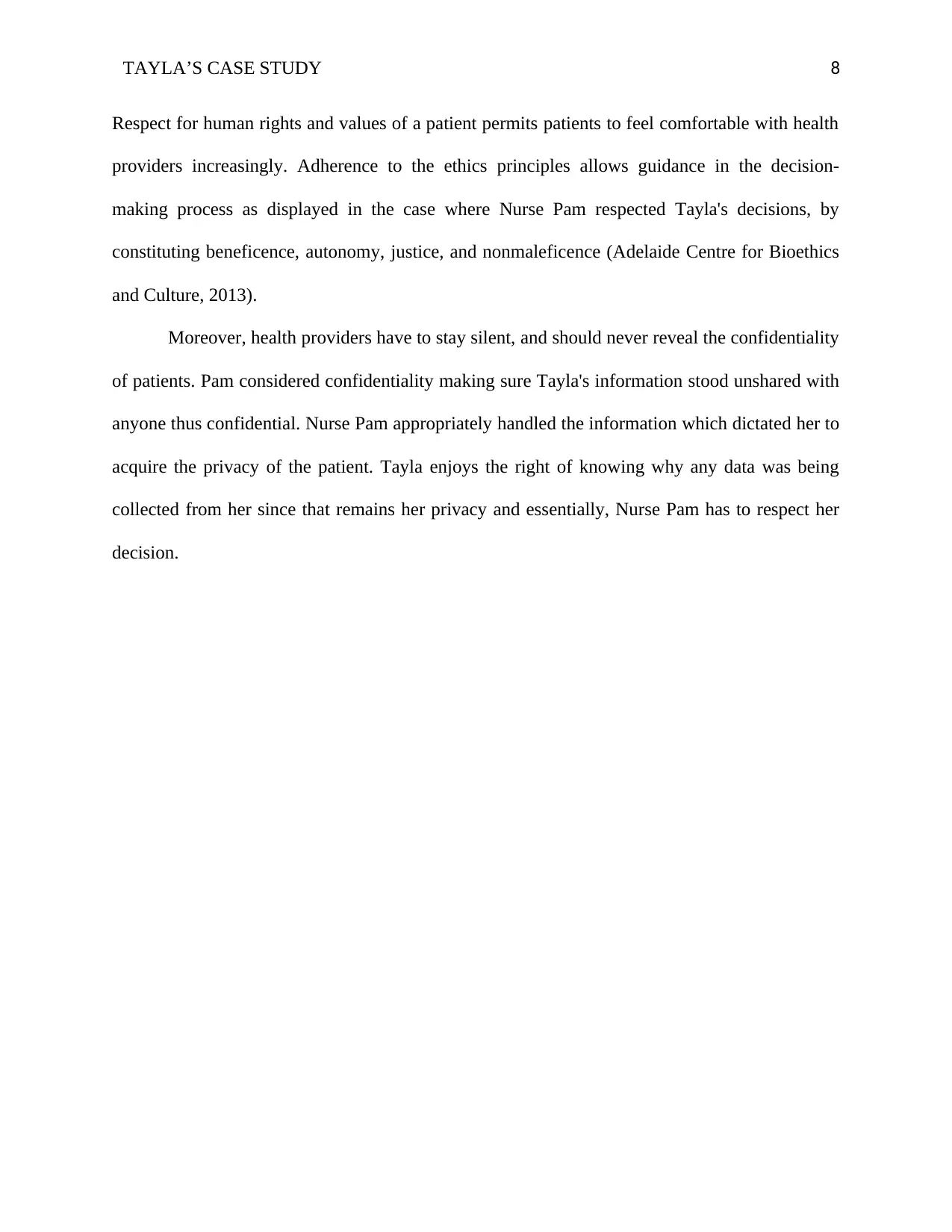
TAYLA’S CASE STUDY 8
Respect for human rights and values of a patient permits patients to feel comfortable with health
providers increasingly. Adherence to the ethics principles allows guidance in the decision-
making process as displayed in the case where Nurse Pam respected Tayla's decisions, by
constituting beneficence, autonomy, justice, and nonmaleficence (Adelaide Centre for Bioethics
and Culture, 2013).
Moreover, health providers have to stay silent, and should never reveal the confidentiality
of patients. Pam considered confidentiality making sure Tayla's information stood unshared with
anyone thus confidential. Nurse Pam appropriately handled the information which dictated her to
acquire the privacy of the patient. Tayla enjoys the right of knowing why any data was being
collected from her since that remains her privacy and essentially, Nurse Pam has to respect her
decision.
Respect for human rights and values of a patient permits patients to feel comfortable with health
providers increasingly. Adherence to the ethics principles allows guidance in the decision-
making process as displayed in the case where Nurse Pam respected Tayla's decisions, by
constituting beneficence, autonomy, justice, and nonmaleficence (Adelaide Centre for Bioethics
and Culture, 2013).
Moreover, health providers have to stay silent, and should never reveal the confidentiality
of patients. Pam considered confidentiality making sure Tayla's information stood unshared with
anyone thus confidential. Nurse Pam appropriately handled the information which dictated her to
acquire the privacy of the patient. Tayla enjoys the right of knowing why any data was being
collected from her since that remains her privacy and essentially, Nurse Pam has to respect her
decision.
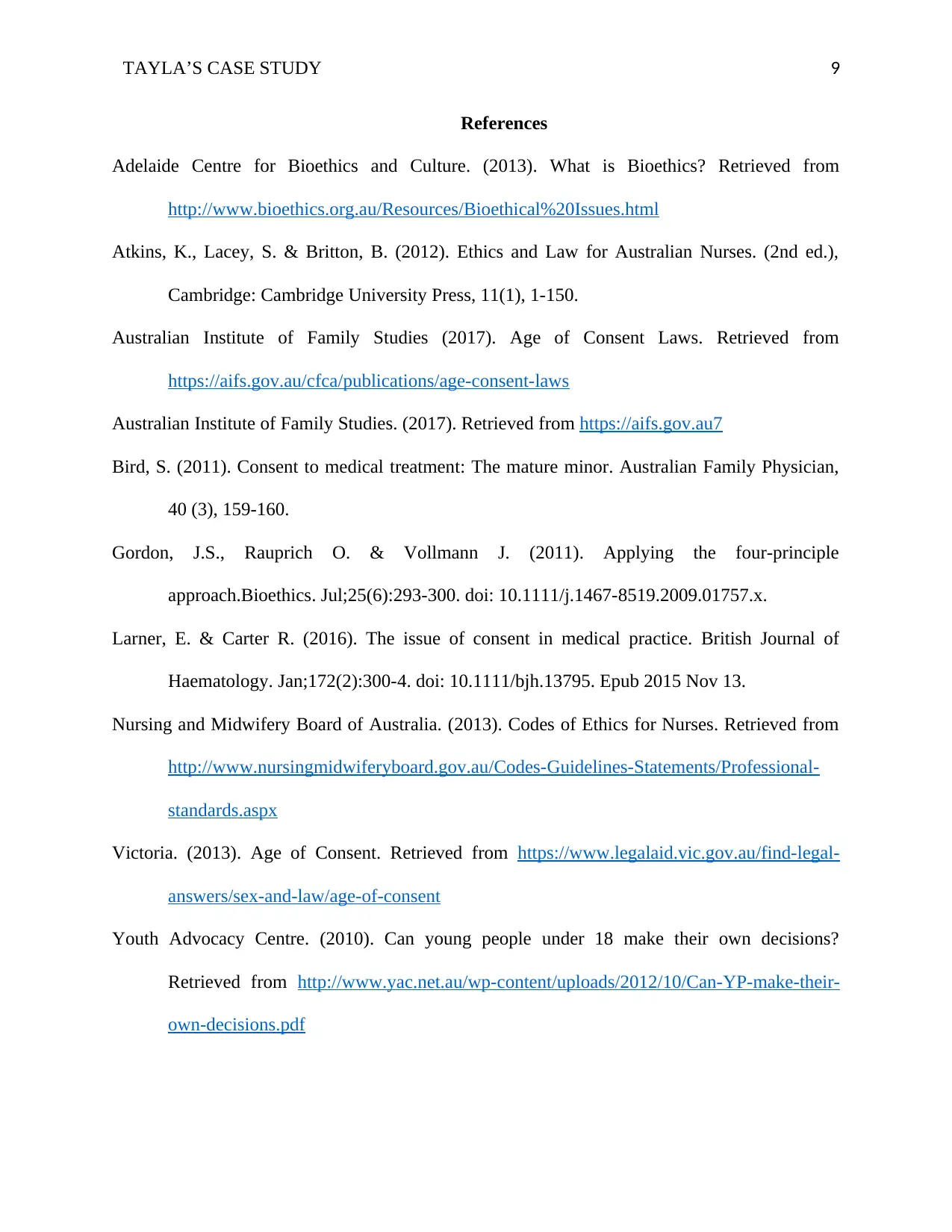
TAYLA’S CASE STUDY 9
References
Adelaide Centre for Bioethics and Culture. (2013). What is Bioethics? Retrieved from
http://www.bioethics.org.au/Resources/Bioethical%20Issues.html
Atkins, K., Lacey, S. & Britton, B. (2012). Ethics and Law for Australian Nurses. (2nd ed.),
Cambridge: Cambridge University Press, 11(1), 1-150.
Australian Institute of Family Studies (2017). Age of Consent Laws. Retrieved from
https://aifs.gov.au/cfca/publications/age-consent-laws
Australian Institute of Family Studies. (2017). Retrieved from https://aifs.gov.au7
Bird, S. (2011). Consent to medical treatment: The mature minor. Australian Family Physician,
40 (3), 159-160.
Gordon, J.S., Rauprich O. & Vollmann J. (2011). Applying the four-principle
approach.Bioethics. Jul;25(6):293-300. doi: 10.1111/j.1467-8519.2009.01757.x.
Larner, E. & Carter R. (2016). The issue of consent in medical practice. British Journal of
Haematology. Jan;172(2):300-4. doi: 10.1111/bjh.13795. Epub 2015 Nov 13.
Nursing and Midwifery Board of Australia. (2013). Codes of Ethics for Nurses. Retrieved from
http://www.nursingmidwiferyboard.gov.au/Codes-Guidelines-Statements/Professional-
standards.aspx
Victoria. (2013). Age of Consent. Retrieved from https://www.legalaid.vic.gov.au/find-legal-
answers/sex-and-law/age-of-consent
Youth Advocacy Centre. (2010). Can young people under 18 make their own decisions?
Retrieved from http://www.yac.net.au/wp-content/uploads/2012/10/Can-YP-make-their-
own-decisions.pdf
References
Adelaide Centre for Bioethics and Culture. (2013). What is Bioethics? Retrieved from
http://www.bioethics.org.au/Resources/Bioethical%20Issues.html
Atkins, K., Lacey, S. & Britton, B. (2012). Ethics and Law for Australian Nurses. (2nd ed.),
Cambridge: Cambridge University Press, 11(1), 1-150.
Australian Institute of Family Studies (2017). Age of Consent Laws. Retrieved from
https://aifs.gov.au/cfca/publications/age-consent-laws
Australian Institute of Family Studies. (2017). Retrieved from https://aifs.gov.au7
Bird, S. (2011). Consent to medical treatment: The mature minor. Australian Family Physician,
40 (3), 159-160.
Gordon, J.S., Rauprich O. & Vollmann J. (2011). Applying the four-principle
approach.Bioethics. Jul;25(6):293-300. doi: 10.1111/j.1467-8519.2009.01757.x.
Larner, E. & Carter R. (2016). The issue of consent in medical practice. British Journal of
Haematology. Jan;172(2):300-4. doi: 10.1111/bjh.13795. Epub 2015 Nov 13.
Nursing and Midwifery Board of Australia. (2013). Codes of Ethics for Nurses. Retrieved from
http://www.nursingmidwiferyboard.gov.au/Codes-Guidelines-Statements/Professional-
standards.aspx
Victoria. (2013). Age of Consent. Retrieved from https://www.legalaid.vic.gov.au/find-legal-
answers/sex-and-law/age-of-consent
Youth Advocacy Centre. (2010). Can young people under 18 make their own decisions?
Retrieved from http://www.yac.net.au/wp-content/uploads/2012/10/Can-YP-make-their-
own-decisions.pdf
1 out of 9
Related Documents
Your All-in-One AI-Powered Toolkit for Academic Success.
+13062052269
info@desklib.com
Available 24*7 on WhatsApp / Email
![[object Object]](/_next/static/media/star-bottom.7253800d.svg)
Unlock your academic potential
© 2024 | Zucol Services PVT LTD | All rights reserved.





